'My God, we could win half the world over just by our food alone.'
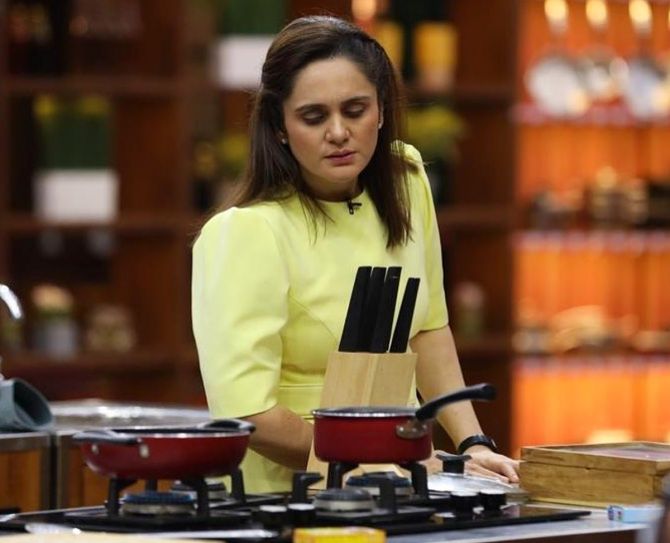
India's first woman chef to earn a Michelin star in 2019, and then an awesome second one in 2023, is a pucca Mumbai girl.
Garima Arora is her daddy's girl too. He inspired her to cook from young.
So did being Punjabi -- "You can imagine what our household was like."
Growing up in Navi Mumbai, in a Punjabi family where, the soft-spoken chef says, food was a "big part", and robust, atha-katha Punju fare like rajma, kadhi and plump gobhi parathas were staples, she spent a lot of the time in the kitchen cooking with her dad Anil Arora, who ran a construction company, but now owns an exhibition and events company.
"Cooking wasn't ever a chore in my house. The fun they had experimenting and whisking up wicked culinary storms, ultimately lead her to become a chef, although Garima made a short detour into the world of journalism and had a job at the Indian Express, before realising that cooking, not writing was her oeuvre.
"I was never a very good writer or very good journalist, to be honest. My heart was not into it."
Her dad supportively helped Garima find her path to her second career and financed her studies towards a diploma at La Cordon Bleu, Paris. "This one time my dad had a conversation with me, he told me that whatever I ever wanted to study at any time in life, I wouldn't have to think twice. He would give me the money for any education. Very jokingly, he said 'Don't ever come to me expecting me to find you a groom or pay for your wedding (although he did eventually pay for her wedding because most of the guests were his)'. You take care of all of that on your own, I've raised you well enough. As a young girl, he instilled in me the value of education, hard work and earning your own money."
She later worked at Noma in Copenhagen, the gastronomically avantgarde Rene Redzepi-run three-Michelin-star restaurant, who she credits as being the "most influential" to her culinary career.
"It changed me not only as a cook, but also as a person. He has an amazing kitchen, an amazing world they've created for themselves there. They taught me that cooking was not only a profession, but something to be proud of, taking pride in what you do, your history, your culture, your heritage, and putting the best form of it forward."
After working in the restaurant industry across the map, including in Bangkok, Garima settled down in the Thai capital with her pilot husband, rescue dog Aloo (she's a huge dog lover) and began GAA in April 2017.
It is a 'modern' Indian fine dining restaurant in Bangkok situated in a refurbished, picturesque baan ruen thai or traditional home, offering dishes creatively imagined from the freshest and most unique local ingredients married with Indian flavours and condiments, like buckwheat crisp with smoked jaggery butter and caviar or crayfish with betel leaf chutney and meetha rice or mahua flower-flavoured ice cream topped with lychee ice.
Success followed swiftly with a place on Asia's 50 Best Restaurants and the World's 50 Best Restaurants lists and her first Michelin star, 18 months later at the young age of 32 and the next for 2024, wins she modestly accepts.
"Being in India is being one with the food. And every moment is living the food" Garima Arora tells Rediff.com's Vaihayasi Pande Daniel in an exclusive interview.
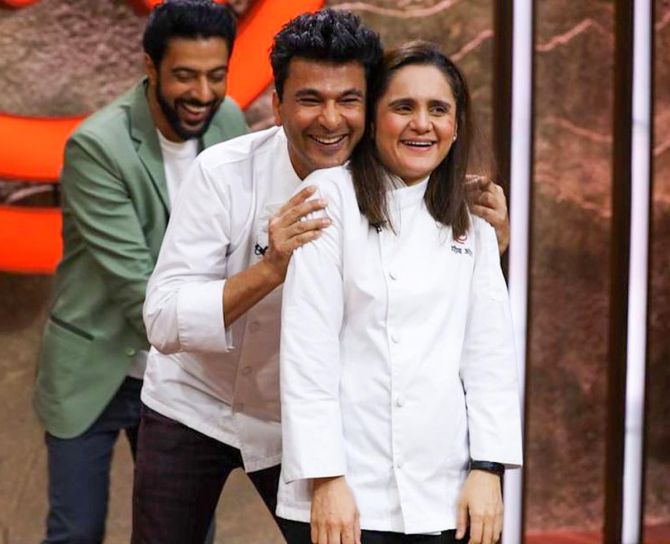
What do you like most about cooking? What do you not enjoy?
I think the answer to both is the guests, the people you cook for. When you cook for people who enjoy the food, who seem to understand what you're trying to do, it's always such a delight.
You cook for happy guests. When your guests are happy, you're happy.
Every now and then, we do have guests who are impossible to please (laughs), and those guests can be quite difficult to deal with.
Both good moments and not so good ones come from the people who eat your food.
What are your signature dishes? What is the Garima technique?
The first time, when you eat something as a young adult or as a child, something interesting and fun, not only do you find it delicious, but it also kind of makes you think. And that's how I like to cook, and that's what I chase even as a cook, I feel.
That's what you find with GAA's food, whose flavours are Indian -- sometimes with taste, sometimes with techniques, sometimes with the combination of flavors.
So, it's something new, something that excites the palate, but also kind of makes you think about what you're eating.
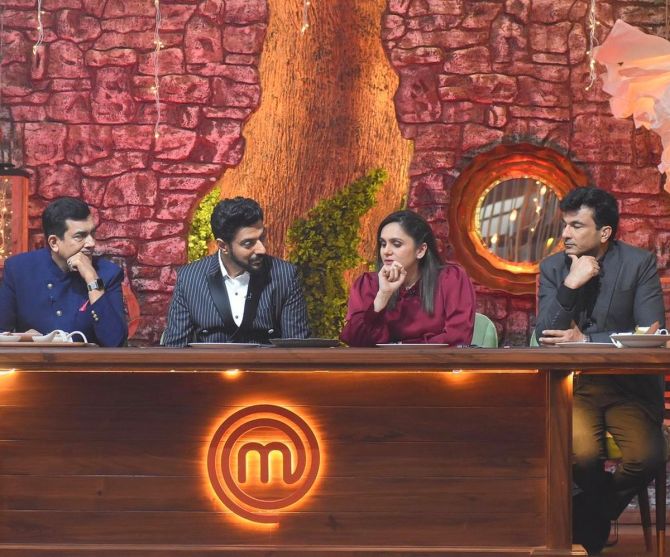
What did you feel when you got your first Michelin star, then the second?
Of course, it's a great validation, getting any recognition from your peers in your industry. The first star was great. Getting the second was even greater, the feeling.
More than anything else, I think it's a win for the team. It's their hard work that comes through.
A restaurant is not run by one person. It's a collaborative effort.
Of course, you, as a head chef, are responsible for bringing everyone together, but at the end of the day, it's everybody's hard work that pitches in. So, yes, both times very happy.
What do you feel is special about Indian food, and how does it influence or teach one about cooking?
It's thousands of years of culinary heritage that we have access to today. Sometimes it's difficult to access it because it's not catalogued, like, probably French cuisine is, but our cuisine is older than that.
But once you do tap into it, there's charcoal cooking, cooking on a live fire, tapping into umami from vegetables… There are so many techniques that give an Indian cook an edge over, I feel, other chefs and other cooks.
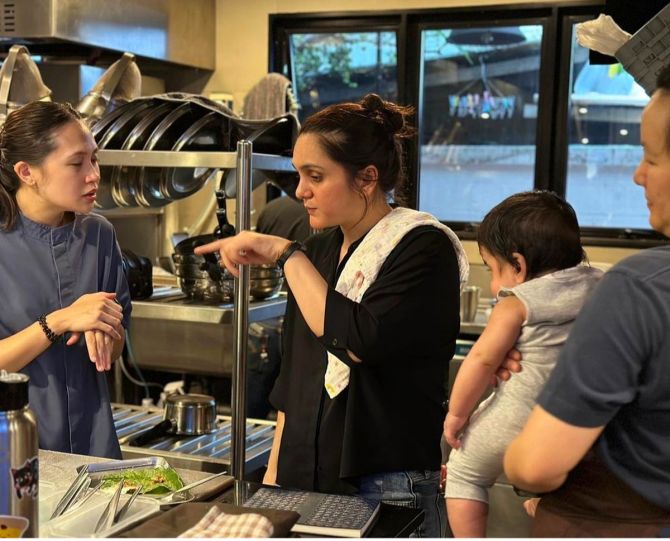
Indian cooking does not require very exact measurements and it's a very sort of casual way of cooking, yet it's such an art.
It's a more intimate way of cooking. That's how I would put it.
You can whip up some egg whites, stick it in the oven, and call it a souffle. But you can't do the same with, say, a sabzi you're making at home or even a simple dal.
You have to be one with the cooking process. You have to know when your onions-tomatoes are cooked enough.
You have to know: 'Okay, today I'm going to use this spice as a tadka (seasoning) and why am I going to use it. We don't layer with the 20-30 spices that you get in a curry house. That's not how we cook. Our cooking at home is more nuanced. You have to be one with the cooking every step of the way.
Estimates or guesswork that goes into this cuisine makes it a more intimate cuisine than anything else. And that translates to the plate as well.
The moment that the cook has had with the food, it translates onto the table.
It's less scientific and more organic. Because when something is being bhuno-ed, you just have to know when the bhuno-ing is done?
Exactly. No recipe book can tell you how much to bhuno it, you kind of have to be in that moment.
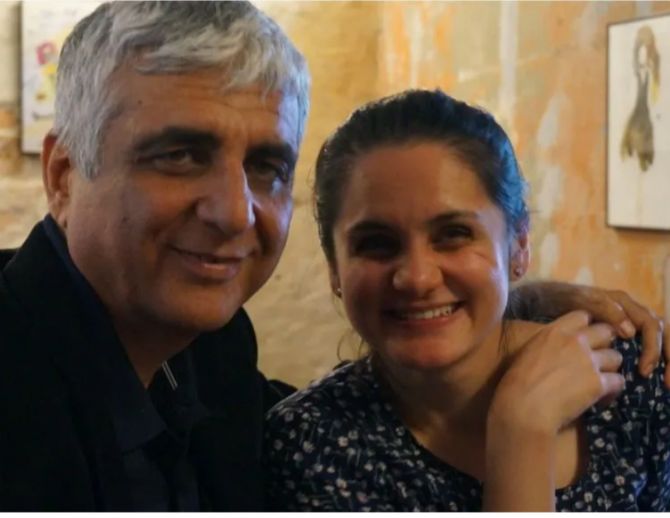
When you come back to India, can you could describe any of your favourite food discovery journeys?
Oh, they're unlimited (laughs). Every moment back home is something or the other.
You go to your neighbour's house, suddenly you are exposed to a totally new cuisine, a totally new flavor.
You walk down the road and the vegetable sellers are selling something that it's only in season for... I don't know... one month. That's it.
There's no one culinary moment in India that will define your time there.
Being in India is being one with the food. And every moment is living the food, I feel.
You can't experience India without experiencing its food. It's impossible.
Food is an expression of affection in India. Nobody comes to your home and gets just a glass of water. They are sort of showered with food.
That comes from our hospitality, that is different from everywhere else in the world, that atithi devo bhavaa.
You feed your guests as if you're taking a pig to slaughter (fattening them).
Our hospitality, together with our cuisine combined, makes dining in India very special and eating in an Indian household very special.
That's what we recreate in our restaurant as well. We are a two-Michelin-star restaurant, but we are not stuffy and fussy about our service at all.
I tell my servers, whose first language is not English, that don't hesitate, don't let that hold you back.
When you go and approach the table, let your personality shine through.
I know our guests are from all over the world and they don't understand your language -- and probably your English is not very clear to them -- but that adds to the charm.
They won't remember what you said. They will always remember how you made them feel.
That's the feeling that we want our guests at GAA to leave with, which is something we get from our cuisine, our heritage.
That a guest is in the form of God, and that's how we treat them.
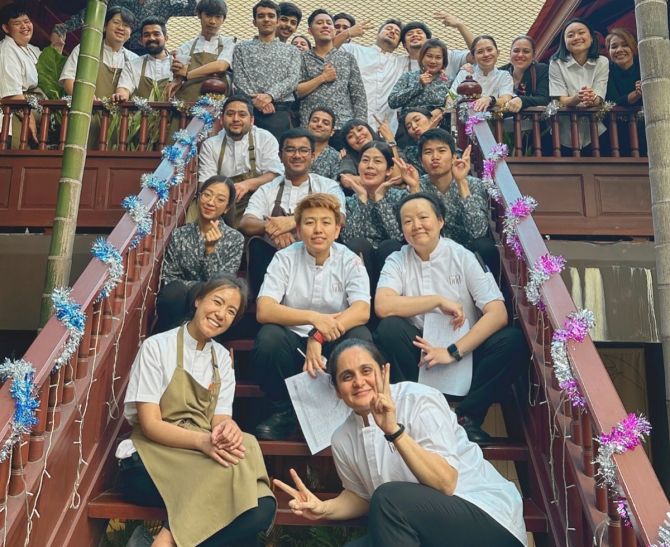
Among your local diners, what are some of the popular dishes or offerings?
We do some easy-to-understand things, some really naughty ones as well.
We have only one menu, a tasting menu, not an a la carte menu and the main course has always been vegetarian.
That's very purposely done to highlight what is possible, because any fine dining restaurant you go to around the world, you climax to a meat dish, right? One final meat dish of beef or a lamb or whatever have you, in all its glory. But we give the same treatment to a vegetable.
That's what we are doing right now with the durian. It's a very notorious, but we cook it in the tandoor with chilly, lime and aamchur (dry mango powder) and serve it as a main course.
Of course, that always raises some eyebrows when people see that on the menu. But they leave so happy, thrilled and excited by having tried something totally new and different. That is something I'm really fond of on the menu currently.
What is your idea of a simple meal, and what do you cook for your family?
I have a seven month old right now, and he's on purees, boiled food and all of those kinds of things. It's so much fun to see him discover flavours.
As a chef, maybe it's only me or maybe every parent feels like that, but seeing him kind of discover flavours and textures is really exciting. It's thrilling to see.
Me, myself, I'm a very simple eater. I eat one or maximum two meals a day, and I work out. I try to take care of myself.
I feel I have more energy when I personally balance my macros.
I make sure I eat more fat and protein and less carbohydrates. That makes me happy, mindful about my food when I cook for my guests.
Breakfast for me most days is the spinach and kale sauteed with fresh turmeric and ginger with boiled eggs on the side.
Dinner is a roast chicken with maybe like a salad or something.
I am a very, very boring eater. Most chefs are, you'll be surprised.
We use our 20s for all the debauchery that happens. In our 30s and 40s, we realise that, okay, we need to take care of ourselves.
It's so easy to let go as a cook. Late nights and wines and parties with other chefs. I think we've all done that as cooks. But there comes a time in life when you start taking care of yourself a lot more, and then your relationship with food also changes.
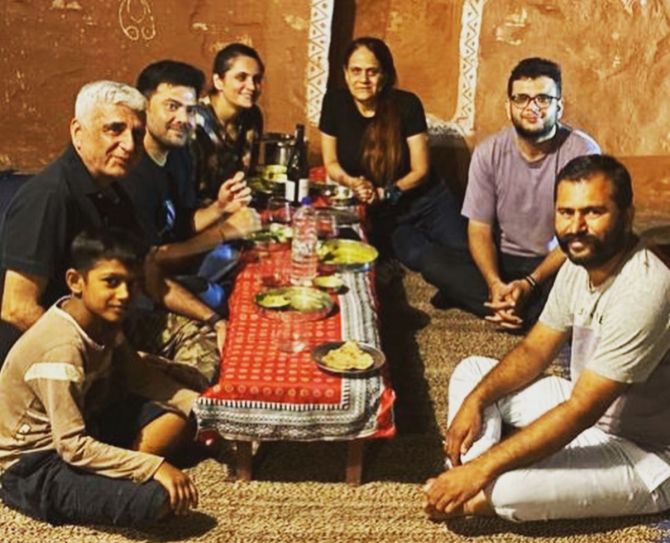
When you travel, how do you avoid bad food? How do you stomach plane food, for instance?
I never eat on airplanes, I'll be honest. You'll never see me eat on an airplane. I've done, like even 16-hour flights without food. I don't eat on an airplane.
What are the common disasters that happen in a restaurant kitchen? What do you firefighting on a daily basis?
You'll be surprised! We do a tasting menu -- sometime a guest really enjoys one course, and then they would ask for a repeat. Everything is kind of choreographed in a way that that throws us off.
Of course, it's a compliment to us when guests say, 'Okay, I'd like another repeat of this'. And the waiter smiles and says, ''Yes, of course, certainly'.
As soon as he turns from the table, probably his smile vanishes, because now he's got to deal with the chef. And the entire service kind of being thrown out of its choreography.
One table messing up, or wanting to repeat something, kind of throws off the entire dining room.
Of course, we don't let our diners know that, but the kitchen is in chaos in that moment. But it's all part of cooking.
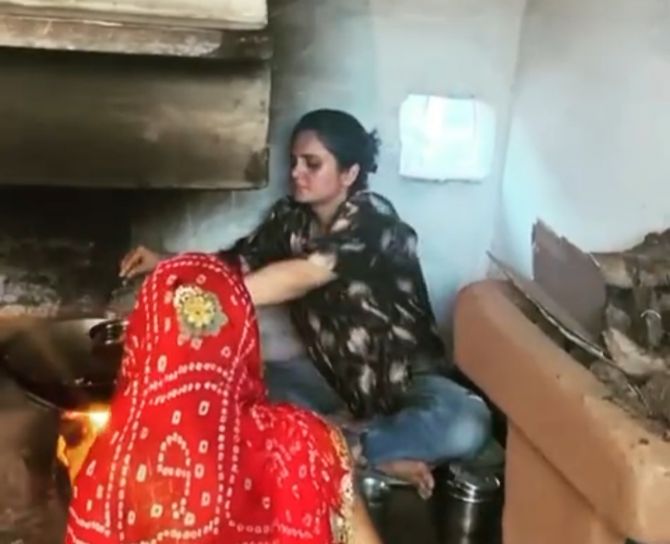
Apart from receiving those Michelin stars, what has been one of your most exciting moments as a chef?
It was cooking for my dad when he came to the restaurant for the first time when we opened like five years ago. I'm very close to my father.
He's in so many ways my best friend, my mentor. When he came to the restaurant and sat down and ate a meal for the first time as a guest, that was a very special moment for me.
It was the same menu that everybody else had, but you can imagine that was a very special evening for me.
What are some of the wonder ingredients of Indian cooking that often get sort of forgotten?
The everyday things, the kathals and the kadus of Indian food.
All our ingredients, these humble vegetables that we grew up with, there's so much possible with them.
This is something I learned when I worked in Copenhagen at Noma.
They have such limited biodiversity as far as their vegetables are concerned, but they're able to create such amazing flavours through different techniques.
Then I looked back at what we have back home, and I was like, wow, we can create a whole new cuisine from all these tools that we have available in Indian food.
The everyday vegetables, the home recipes... We get so caught up with this Mughalai food, which I'm sure it's great, but Indian food is beyond that.
That's such a short part of our history. All these recipes that our mothers and grandmothers have that kind of get forgotten as time passes by and we go for the biryanis and the butter chicken.
I think it's changing. People are starting to enjoy regional delights so much more, understand them and appreciate them.
I discovered this when I had a small stint as a judge on MasterChef India.
I saw all these contestants coming from different parts of the country and cooking their food and the pride that they had in their food.
Honestly, there was not a single biryani that we tasted during the auditions.
It was all, 'This is my Assamese fare', 'This is my Odia fare'. It was amazing to see.
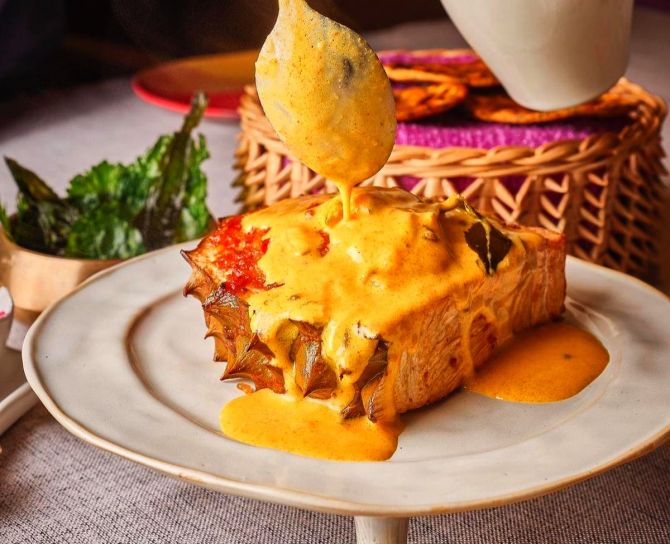
What is your favourite food?
My favourite food back home is always Madras Café (in Matunga, north central Mumbai). That's my first go-to, my first stop back home, followed by Ramanayak (A Rama Nayak Udipi Shri Krishna Boarding, also in Matunga) and Shree Thaker Bhojnalay (in Kalbadevi, south Mumbai). These are a couple of my favourites that I love to eat at.
Do you think Indian food is getting its due in the world or there's still a lot more for people to discover?
A lot more. We're barely, barely starting. Trust me. I think it's a soft power we don't exercise enough. And when I find any ear that will listen to me, my God, we could win half the world over just by our food alone. We've only exported the curries and the naans.
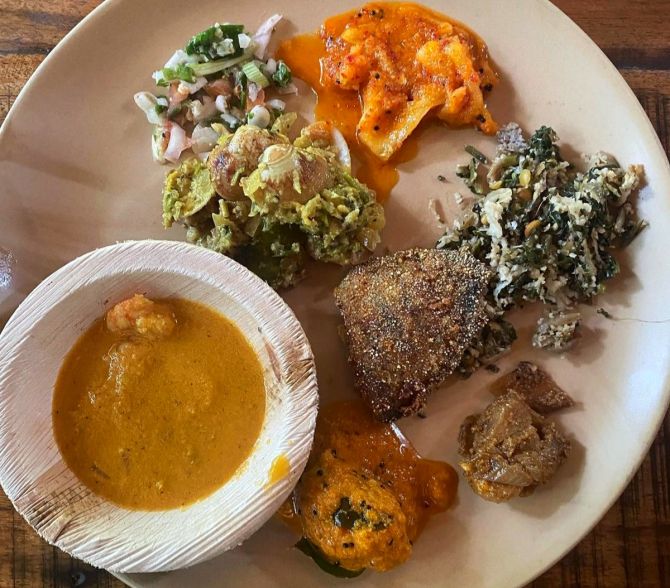
A memorable food experience or journey?
It was probably in Malwan (Maharashtra). Not very recently, like two years ago. We drove to a homestay at this place called Maachli, it's a three-cottage resort homestay in Sindhudurg.
The highlight there is the kitchen, the Malwan kitchen, which is run by the women of the household and a few women from the village itself.
They were nice enough to let me into the kitchen, while my husband, my father, my mom -- I do a lot of holidays, dinners, lunches and stuff with my parents and my husband; like I said, my dad's my best friend -- they were out enjoying their wines and whatnot, I got a chance to spend time in the kitchen.
A very rustic kitchen. Everything is cooked on open fire.
The women of the village were just so excited to share their food with me.
I think those two days that I spent in the kitchen with them was the last time I remember to be so inspired and moved by food.
Garima's Tip: If you are ever at a restaurant eating something unusual and dying to know a special ingredient it contains, don't hesitate to ask the chef! "Chefs love it when people are inquisitive about the smallest details -- 'What's that?' We love it because we know then you're into the food, understanding what we're trying to do. It makes it fun."
Feature Presentation: Rajesh Alva/Rediff.com


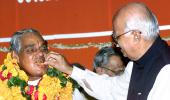








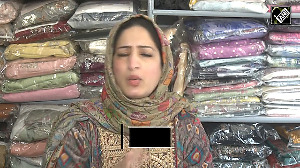
 © 2025
© 2025